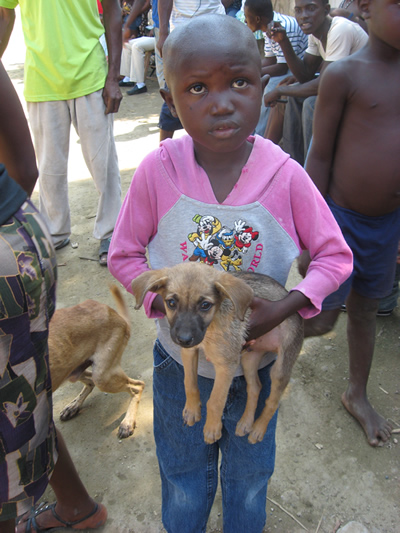Moving Haiti Closer to Rabies Control
By Kelly Crowdis, Christian Veterinary Mission

A young child waits in line at a Haitian government-run canine rabies vaccination clinic. Due to supply shortages and a lack of resources, canine rabies vaccination campaigns are held only every several years. Vaccination is the primary component of rabies control. (Photo by Kelly Crowdis)
Jacque was a 40-year-old carpenter who made furniture to support his family of five. They lived in a small two-room house in the mountains. One day Jacque started feeling bad and stayed home from work. He kept getting worse and then couldn’t walk so his family called the witch doctor who performed several rituals. The next day he started having seizures and became violently aggressive. His neighbors and family carried him four hours down the mountain to a hospital, on a blanket covered door which he had been carving. The next day he died. It was later discovered that two months earlier, he had been bitten by a dog. We hear stories of people dying from rabies all too often because there is no comprehensive education about rabies or what to do if a dog bites you.
Rabies control and prevention in Haiti is something that is near and dear to our hearts. Every year Christian Veterinary Mission (CVM) in Haiti receives multiple phone calls from frantic people wanting to know what to do about a dog or other animal that has bitten them. More often than not, the dogs are exhibiting clinical signs of rabies. Until recently, finding post exposure vaccine and trying to get the dog tested has always been difficult. Thanks to increased cooperation between the Ministry of Agriculture (MARNDR) and the Ministry of Public Health (MSPP) fostered by the US Centers for Disease Control and Prevention (CDC) there is a more reliable system in place to make vaccine available for bite victims and to accurately test animals. Increasing rabies awareness through education, reliable testing, and post exposure treatment is already a reality in several parts of Haiti because of a collaborative CDC/MARNDR/MSPP rabies surveillance program. CVM is excited to invest their support along with CDC to bolster and expand the work of MARNDR and MSPP to control and ultimately eliminate rabies in Haiti.